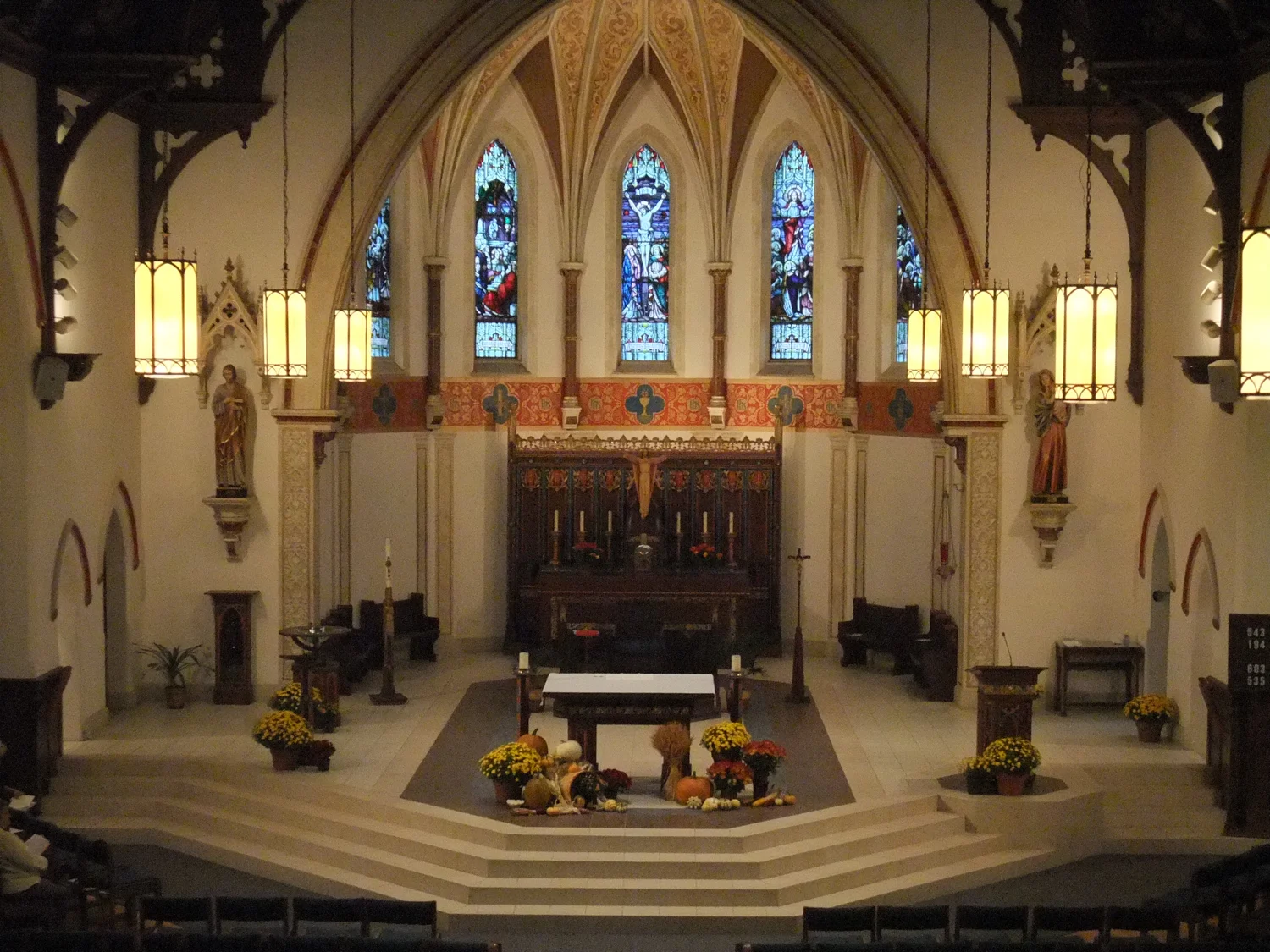VIRTUAL SHARE LENT During Coronavirus Outbreak
HOLY WEEK and Celebration of the Paschal Triduum
MASSES on Salt & Light TV
Statement of the Black Catholic Clergy Caucus, 1968
From the time of its initial presence in the United States until April 1968, the Catholic Church never had an official meeting of its Black Catholic clergy. It also, of course, prevented Black clergy entirely until 1854, possessed no openly Black clergy until 1886, and had no more than a few Black priests at a time until after the second World War. A little over two decades after the war, however, this segment of the Catholic clergy gathered under emergency circumstances after White Supremacy swallowed up the life of Martin Luther King, Jr. in its own sort of “Shot Heard ‘Round the World.”
At this inaugural meeting, the Black Catholic Clergy Caucus produced a statement borne from public concern and meant for public consumption, but which has since become almost an afterthought, and has been unavailable to the public on the internet. In light of recent events, historical parallels, and the need for strong and grounded Black Catholic witness within the American Church, we think it proper to make the statement public once again by reproducing it here in its entirety:
A Statement of the Black Catholic Clergy Caucus, 1968
The Catholic Church in the United States, primarily a white racist institution, has addressed itself primarily to white society and is definitely a part of that society. On the contrary, we feel that her primary, though not exclusive work, should be in the area of institutional, attitudinal and societal change.
Within the ghetto, the role of the Church is no longer that of spokesman and leader. Apart from a more direct spiritual role, the Church’s part must now be that of supporter and learner. This is a role that white priests in the black community have not been accustomed to playing and are not psychologically prepared to play.
The Catholic Church apparently is not cognizant of changing attitudes in the black community and is not making the necessary, realistic adjustments. The present attitude of the black community demands that black people control their own affairs and make decisions for themselves. This does not mean, however, that black leadership is to be exercised only in the black community, but must function throughout the entire gamut of ecclesial society.
It is imperative that the Church recognize this change. White persons working in the black community must be educated to these changing attitudes, and must be prepared to accept and function in conjunction with the prevailing attitudes of the black community.
One of these changes must be a re-evaluation of present attitudes towards black militancy. The violence occurring in the black communities has been categorically condemned and has called forth a wide variety of response, from “shoot to kill” to the recommendation of the Kerner Report. Such violence has even been specified as “Negro violence,” as though there were a substantial or significant difference between violence in the black community and that which has occurred consistently throughout the history of the United States and of the world. Black people are fully aware that violence has been consciously and purposely used by America from its fight for independence to its maintenance of white supremacy. Since the black man is encouraged to fight abroad for white America’s freedom and liberty, we are now asking why it is not moral for him to fight for his liberty at home. We go on record as recognizing:
the reality of militant protest;
that non-violence in the sense of black non-violence hoping for concessions after white brutality is dead;
that the same principles on which we justify legitimate self-defense and just warfare must be applied to violence when it represents black response to white violence;
the appropriateness of responsible, positive militancy against racism is the only Christian attitude against this or any other social evil.
Because of its past complicity with and active support of prevailing attitudes and institutions of America, the Church is now in an extremely weak position in the black community. In fact, the Catholic Church is rapidly dying in the black community. In many areas, there is a serious defection especially on the part of black Catholic youth. The black community no longer looks to the Catholic Church with hope. And unless the Church, by an immediate effective and total reversing of its present practices, rejects and denounces all forms of racism within its ranks and institutions and in the society of which she is a part, she will become unacceptable in the black community.
We, The Black Catholic Clergy Caucus, strongly and deeply believe that there are few choices left to the Catholic Church, and unless it is to remain an enclave speaking to itself, it must begin to consult the black members of the Church, clerical, religious and lay. It must also begin to utilize the personnel resources of black Catholics in leadership and advisory positions in the whole Church and allow them to direct, for the most part, the mission of the Church in the black community. It is especially important that the financial resources channeled into the work of the Church in the black community be allocated and administered by black Catholic leadership. To this end, in charity, we demand:
That there be black priests in decision-making positions on the diocesan level, and above all in the black community.
That a more effective utilization of black priests be made. That the situation where the majority of black priests are in institutions be changed; that black priests be given a choice of assignment on the basis of inclination and talent.
That where no black priests belong to the diocese, efforts be made to get them in or at least consultation with black priests or black-thinking white priests be made.
That special efforts be made to recruit black men for the priesthood. Black priests themselves are better qualified for this recruitment at a time when the Catholic Church is almost irrelevant to the young black men.
That dioceses provide centers of training for white priests intending to survive in black communities.
That within the framework of the United States Catholic Conference, a black-directed department be set up to deal with the Church’s role in the struggle of black people for freedom.
That in all of these areas black religious be utilized as much as possible.
That black men, married as well as single, be ordained permanent deacons to aid in this work of the Church.
That each diocese allocate a substantial fund to be used in establishing and supporting permanent programs for black leadership training.
Source: Stamped With the Image of God: African Americans As God’s Image in Black (American Catholic Identities Series). Edited by Cyprian Davis and Jamie T Phelps (Orbis, 2004).
Citation: “A Statement of the Black Catholic Clergy Caucus,” in Black Theology Documentary History, Volume 1: 1966-1979 2nd ed. revised, ed. James Cone and Gayraud S Wilmore (Maryknoll, NY Orbis Books 1993) 230-2 originally in Freeing the Spirit 1, no. 3 (1972).
Image: African American Bishops, mid- to late 1980s. Seated, left to right- Most Reverends Joseph A. Francis, SVD; Harold R. Perry, SVD; Joseph L. Howze; Eugene A. Marino, SSJ; James P. Lyke, OFM; Standing, left to right- Most Reverends Wilton D. Gregory; Emerson J. Moore; Moses B. Anderson, SSE; J. Terry Steib, SVD; John H. Ricard, SSJ
Source: Black Catholics for Life
Catholics cannot remain indifferent to racism, Phoenix bishop says
https://catholic-sf.org/news/injustice-of-racism-perpetuated-by-indifference-says-bishop
Catholics have a key part to play— in cooperation with God’s grace— in overcoming racism, the bishop of Phoenix said at the diocesan Mass for Forgiveness of the Sin of Racism this week.
“George Floyd did not die alone. Jesus was with him—praying with him and for him. At every time and every place, Jesus draws near to every person, especially in times of suffering and at the hour of death,” Bishop Thomas Olmsted of Phoenix said in the homily June 8.
As the Church gathers to pray for forgiveness for the sin of racism, Olmsted said, it is important to define what Catholics mean by the term.
The Catechism of the Catholic Church offers guidance, he said, defining it as “unjust discrimination on the basis of a person’s race.”
In Paragraph 1935 of the Catechism, it says “every form of social or cultural discrimination in fundamental personal rights on the grounds of sex, race, color, social conditions, language, or religion must be curbed and eradicated as incompatible with God's design.”
Olmsted said he has seen racial discrimination manifest itself among some Catholics in Arizona. Nearly half of Phoenix’s pastors were born in other countries, he said, and sadly not all have been received well by Catholics in the diocese.
For example, “on the day that I installed one of our finest pastors, protestors came to the parking lot and distributed flyers on car windows denouncing the bishop for replacing their beloved former pastor with ‘these Africans,’” Olmsted said.
The Church provides, through the Sacrament of Confession, a means by which those who have perpetuated the sin of racism can seek God’s mercy.
“The rich mercy of God restores human dignity, even to the most hardened of sinners, if we have the humility to say six words: ‘I am sorry. Please forgive me,’” he said.
Jesus himself, and saints like Pope John Paul II, have modeled the kind of forgiveness that is necessary for healing from racism, Olmsted said.
“[Racism] is overcome by God, by His mercy. It is not our achievement. We have a key part to play, in cooperation with His grace, but only God can change minds and hearts. That’s why the Sacraments of Confession and the Eucharist play such vital roles in overcoming the sin of racism,” Olmsted said.
In responding to racism, Catholics— even if they are not themselves racist— must not allow their hearts to harden, frozen by indifference, and simply fail to respond altogether, Olmsted said.
“While racism is a sinful act that prejudice, injustice, and lack of respect for human dignity brings about, racism also hides itself behind indifference. Racists may not get caught because they are doing “nothing.” But, in Jesus’ description of the Last Judgment, found in Matthew 25:4, sin is depicted not as what people did but ‘what they failed to do,’” he said.
Olmsted recalled that during March 2000, Pope John Paul II led the whole Church in a Day of Pardon, in which he asked the entire Church to place itself “before Christ, who out of love, took our guilt upon Himself,” and to make a “profound examination of conscience,” and to “forgive and ask forgiveness.”
“Inspired by the example of St. John Paul II, let us beg the Lord Jesus, at this Mass, for the grace we need to overcome the evil of racism and to build a society of Jesus and solidarity,” Olmsted concluded.
FREE Organically Grown CHERRY TOMATO PLANTs from Project Harvest
Project Harvest provides support for grassroots community gardens and food sustainability in Indigenous villages in Guatemala.
MESSAGE OF HIS HOLINESS,POPE FRANCIS,FOR THE CELEBRATION OF THE,XLIX WORLD DAY OF PEACE,,1 JANUARY 2016,,Overcome Indifference and Win Peace
1. God is not indifferent! God cares about mankind! God does not abandon us! At the beginning of the New Year, I would like to share not only this profound conviction but also my cordial good wishes for prosperity, peace and the fulfilment of the hopes of every man and every woman, every family, people and nation throughout the world, including all Heads of State and Government and all religious leaders.












